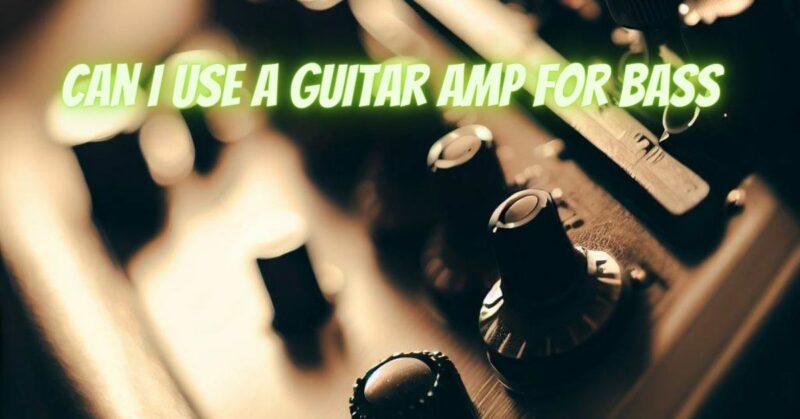For musicians exploring both the guitar and bass realms, the idea of using a guitar amplifier for a bass guitar might be tempting due to convenience and cost-saving reasons. However, using a guitar amp for bass is a topic of debate among musicians and audio enthusiasts. In this article, we will examine the possibilities and potential pitfalls of using a guitar amp with a bass guitar to help you make an informed decision about your setup.
The Key Differences Between Guitar and Bass Amps
Guitar and bass amplifiers are designed to meet the specific needs and characteristics of their respective instruments. Understanding the key differences between these amplifiers is crucial to determining whether using a guitar amp for bass is feasible.
- Frequency Range: Bass guitars produce lower frequencies than standard guitars. Bass amps are engineered to handle and amplify these lower frequencies effectively, ensuring clear and powerful bass tones. Guitar amps, on the other hand, prioritize midrange and treble frequencies, which might not handle the low-end of a bass guitar optimally.
- Power Handling: Bass amplifiers usually have higher power handling capabilities than guitar amps. This is because bass frequencies require more power to reproduce accurately without distortion or loss of clarity. Using a bass guitar on a guitar amp with lower power handling might result in underpowered and distorted sound.
- Speaker Size and Design: Bass amplifiers often come equipped with larger speakers or specially designed speakers to handle the low frequencies of a bass guitar. Guitar amp speakers, while suitable for midrange and treble frequencies, might not handle the powerful low-end of a bass guitar well, potentially causing damage to the speakers over time.
The Risks of Using a Guitar Amp for Bass
While it is technically possible to connect a bass guitar to a guitar amp, doing so poses several risks and limitations:
- Sound Quality: A guitar amp’s frequency response might not adequately reproduce the low-end frequencies of a bass guitar, resulting in thin and muddy sound lacking the desired bass punch and clarity.
- Speaker Damage: Using a guitar amp at high volumes with a bass guitar can overload the speakers, especially if they are not designed to handle lower frequencies. This can lead to speaker damage and costly repairs.
- Lack of Power: Bass guitars require more power to produce their lower frequencies. Using a guitar amp with lower power handling might lead to underpowered and distorted sound.
- Reduced Lifespan: Regularly using a guitar amp for bass can significantly reduce the lifespan of the amp’s components, especially the speakers.
Alternatives to Using a Guitar Amp for Bass
If you play both guitar and bass and want to use a single amplifier for both instruments, consider the following alternatives:
- Combo Amps: Some combo amplifiers are designed to accommodate both guitar and bass. These hybrid amps have specific features that make them suitable for both instruments, ensuring better sound quality and power handling.
- Multi-Instrument Amps: There are multi-instrument amplifiers available that can handle various instruments, including guitar and bass. These amps are designed with versatile inputs and controls to cater to different instruments’ needs.
- Dedicated Bass Amp: Investing in a dedicated bass amp will ensure optimal sound quality and performance for your bass guitar. This approach will provide you with the powerful low-end response and clarity that a dedicated bass amp is designed to deliver.
Using a guitar amp for bass might seem like a convenient solution, but it comes with significant risks and limitations. Guitar amps are not optimized to handle the lower frequencies of a bass guitar, potentially resulting in poor sound quality and speaker damage. To achieve the best performance and sound reproduction, it is recommended to use a dedicated bass amp or a multi-instrument amp specifically designed to handle both guitar and bass. This way, you can enjoy the full potential of both instruments without compromising on audio quality or risking damage to your equipment.


